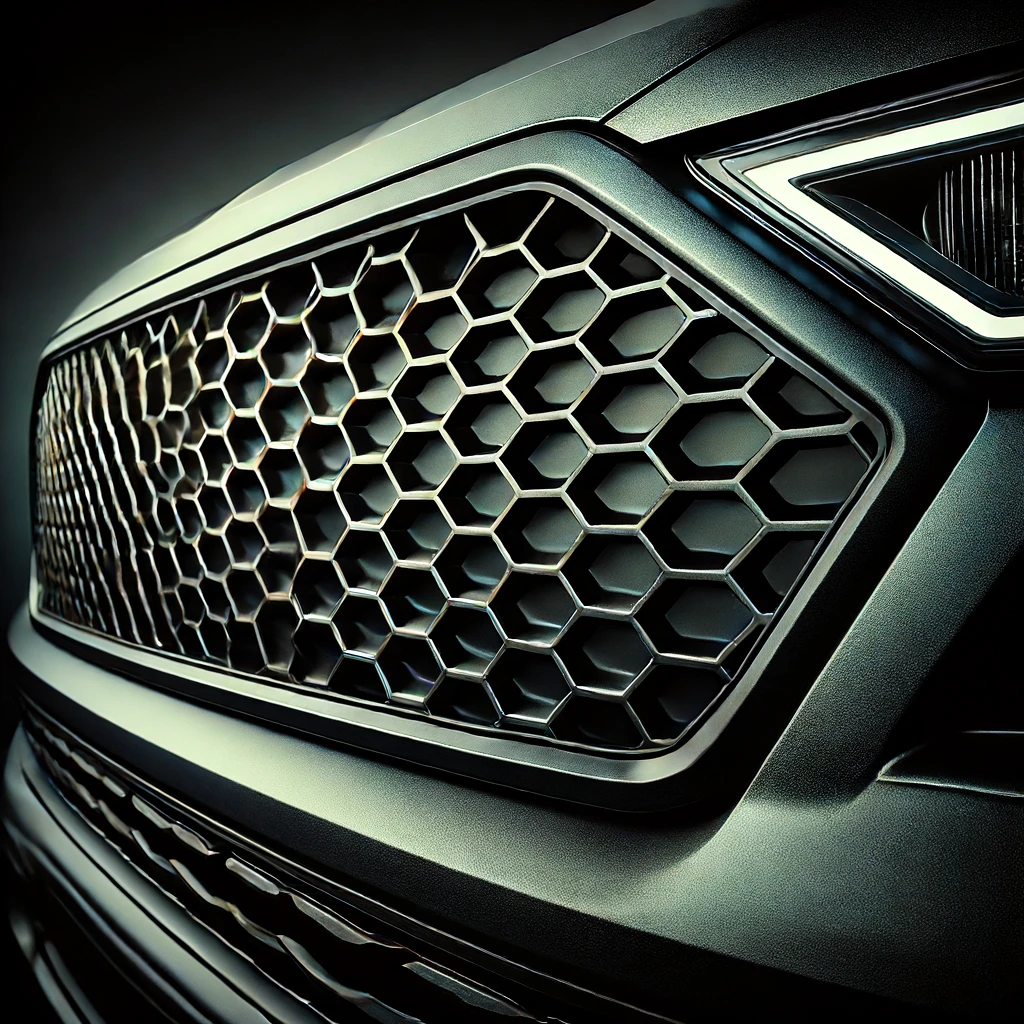from debris, allow airflow to cool the engine, and contribute to the vehicle’s overall design. Car grilles are made from various materials, each with its own set of advantages and disadvantages. In this blog post, we will explore the most common materials used for car grilles, including their pros and cons.
Introduction
Car grilles come in a variety of materials, each offering unique benefits and potential drawbacks. The choice of material can affect the grille's durability, weight, appearance, and cost. Understanding the differences between these materials can help you make an informed decision when selecting a grille for your vehicle.
Common Materials for Car Grilles
1. Plastic
Overview
Plastic is one of the most commonly used materials for car grilles due to its versatility and cost-effectiveness. Grilles made from plastic are typically manufactured using injection molding, which allows for intricate designs and shapes.
Pros
- Lightweight: Plastic grilles are significantly lighter than those made from metal, which can contribute to better fuel efficiency.
- Cost-Effective: Generally less expensive to produce and purchase, making them a popular choice for many vehicle manufacturers.
- Design Flexibility: Can be molded into complex shapes and designs, offering a wide range of styling options.
- Corrosion-Resistant: Plastic does not rust or corrode, making it ideal for use in various weather conditions.
Cons
- Durability: Plastic grilles are not as durable as metal and can crack or break upon impact.
- Heat Resistance: May not withstand high temperatures as well as metal grilles, which can be an issue in high-performance vehicles.
2. Aluminum
Overview
Aluminum is a popular material for car grilles due to its combination of strength, lightweight, and resistance to corrosion. It is commonly used in aftermarket grilles and high-end vehicles.

Pros
- Lightweight: Aluminum is lighter than steel, which can improve vehicle performance and fuel efficiency.
- Corrosion-Resistant: Naturally resistant to rust and corrosion, making it suitable for use in various environmental conditions.
- Aesthetic Appeal: Offers a high-end, polished look that enhances the vehicle's appearance.
- Durability: More durable than plastic, providing better protection for the engine and radiator.
Cons
- Cost: More expensive than plastic, which can increase the overall cost of the grille.
- Damage: While durable, aluminum can still dent or bend upon impact.
3. Stainless Steel
Overview
Stainless steel is known for its strength, durability, and corrosion resistance. It is a premium material often used in high-end and custom grilles.
Pros
- Durability: Extremely strong and durable, providing excellent protection for the engine and radiator.
- Corrosion-Resistant: Highly resistant to rust and corrosion, even in harsh weather conditions.
- Aesthetic Appeal: Offers a sleek, polished look that adds a touch of luxury to the vehicle.
- Heat Resistance: Can withstand high temperatures, making it ideal for performance vehicles.
Cons
- Weight: Heavier than plastic and aluminum, which can affect fuel efficiency and vehicle performance.
- Cost: Typically more expensive than plastic and aluminum grilles, reflecting its premium quality.
4. ABS Plastic
Overview
ABS (Acrylonitrile Butadiene Styrene) plastic is a type of thermoplastic known for its strength and impact resistance. It is commonly used in automotive applications, including car grilles.
Pros
- Impact Resistance: More impact-resistant than standard plastic, reducing the likelihood of cracks or breaks.
- Lightweight: Maintains a light weight, contributing to overall vehicle efficiency.
- Cost-Effective: Less expensive than metals, making it an affordable option for many consumers.
- Corrosion-Resistant: Does not rust or corrode, suitable for various weather conditions.
Cons
- Heat Resistance: Not as heat-resistant as metal grilles, which can be a concern in high-performance applications.
- Durability: While more durable than standard plastic, it is still not as strong as metal options.
5. Chrome-Plated Plastic
Overview
Chrome-plated plastic grilles combine the lightweight benefits of plastic with the aesthetic appeal of chrome. This type of grille is popular for its stylish appearance.
Pros
- Aesthetic Appeal: Offers the shiny, high-end look of chrome at a lower cost.
- Lightweight: Combines the light weight of plastic with the appearance of chrome, improving fuel efficiency.
- Corrosion-Resistant: The plastic base is resistant to rust and corrosion.
Cons
- Durability: The chrome plating can peel or chip over time, and the plastic base is less durable than metal.
- Cost: More expensive than standard plastic, though typically less than full metal options.
6. Carbon Fiber
Overview
Carbon fiber is a high-performance material known for its incredible strength-to-weight ratio. It is used in premium and performance vehicles for various components, including grilles.
Pros
- Strength: Extremely strong and durable, offering excellent protection.
- Lightweight: Lighter than most metals, contributing to improved vehicle performance and efficiency.
- Aesthetic Appeal: Provides a unique, high-tech look that stands out.
Cons
- Cost: Very expensive compared to other materials, reflecting its high-performance characteristics.
- Repair: Difficult to repair if damaged, often requiring replacement of the entire component.
Conclusion: Choosing the Right Material for Your Car Grille
When selecting a car grille, consider the material carefully based on your specific needs and preferences. Each material offers distinct advantages and disadvantages:
- Plastic: Lightweight and cost-effective, but less durable.
- Aluminum: Strong, lightweight, and corrosion-resistant, but more expensive.
- Stainless Steel: Extremely durable and corrosion-resistant, but heavy and costly.
- ABS Plastic: Impact-resistant and affordable, but less heat-resistant.
- Chrome-Plated Plastic: Stylish and lightweight, but less durable.
- Carbon Fiber: High-performance and lightweight, but very expensive.
Understanding these pros and cons will help you make an informed decision, ensuring you choose the best grille material for your vehicle’s performance, aesthetic, and budgetary needs.
Check out our selection at Airbagit.com and get the best products on the market!
Join our social media communities on Facebook and Instagram for the best tips and deals in the industry!

